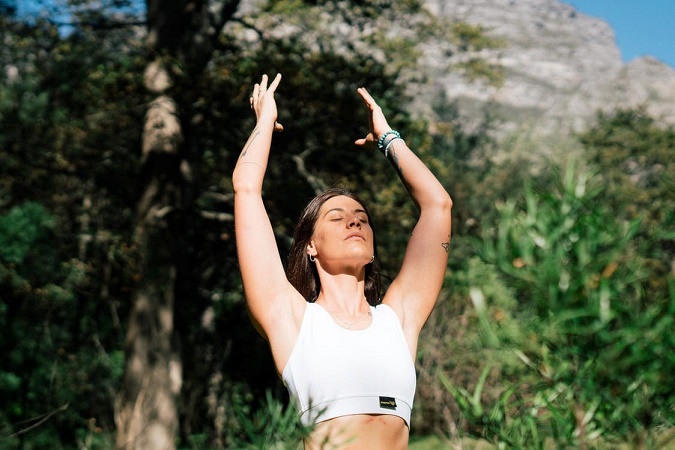Best Outdoor Exercises that Help with Anxiety

Stress and anxiety form an unfortunate, but inevitable part of everyone’s life. Medical statistics show that over half of the global population experience stressful or anxious moments at least once every day.
According to a recent survey by ADAA, anxiety disorder affects the productivity of at least 70% of America’s working population. That is why you must work hard to improve your mental health and alleviate anxiety and stress. One common mental-health boost is outdoor exercising.
If you ask any random person, he/she will list down the many physical benefits of regular exercise. Its ability to lower body sugar and prevent type 2 diabetes, its ability to boost metabolism, and its cardio-protective benefits- name them!
But even as everyone seems to know how important exercise is to their physical health, many people overlook the psychological benefits that come with it.
Outdoor Exercises that Help You with Anxiety
To have good mental health, you need to engage in activities that enhance mood, help you sleep better, and that boost your energy levels.
Here are 5 exercises that will help you achieve that:
1. Short high-intensity exercises
When you sprint at top speed, for example, your stress hormones like cortisol reduce significantly. Also, any short high-intensity exercise expedites the manufacturing of endorphins, the chemicals that are responsible for a positive mood.

2. Aerobic exercise
Aerobics help you breathe better, boosts your metabolism, and stimulates your spirits. Patients suffering from anxiety disorders and clinical depression are advised to have as many regular aerobic exercises as possible as it increases their capacity to exhilarate and relax.
3. Breathing exercise
Formal meditation is great for your breathing. Learn the art of deep, regular, and slow breathing either from a professional life coach or from a yoga expert and be practicing it every time you feel overwhelmed.
Also, learn to pay attention to your breathing patterns at all times. When you start breathing in shallow, erratic, and rapid bits, know that that’s the time to exercise controlled breathing.
Once you have your breathing in order, spare some time for the gentle muscle stretching of yoga.

4. Social games
Social games such as paintball are good at distracting you from all the negativities surrounding your life. They provide you with a natural social support system- people who support you without even realizing that they are helping.
So, get yourself the necessary paintball equipment and get out there.
5. Hiking
Take a route through the forest and enjoy the beauty of nature. You can do this alone or join your local hiking club. The relaxation and stress relief that comes with hiking is unmatched.
And because most hiking trails are free and the hiking gear extremely affordable, hiking is the best outdoor activity to try when on a tight budget.

6. Cycling
Just like hiking, cycling can be adrenaline induced, but also a very therapeutic journey.
In my experience, doing a biking expedition in the mountains is most definitely unforgettable, and something you will want to redo periodically. It helps you log out from your daily routine and anxieties to instead soak up the sun, the fresh air, and the green wilderness of the forest.
If you want to spice it up, you can also choose to invest in an electric bike, definitely recommended for tougher mountain terrains.
How to Exercise Right When Stressed
Do you need an exercise program to help you with anxiety? Well, here is a simple one to follow:
I.) Start with the simple exercises and then raise the bar as you get more experience. Such exercises include jogging, walking, bike, dancing, and a little bit of yoga. You can start with 2 hours a week, distributed over four 30-minutes sessions.
II.) Consistency is the key to effective outdoor exercising, not perfection. You would rather walk every day for 30 minutes than tire yourself in a fitness marathon, say 5 hours every Saturday. In this regard, choose an outdoor activity that excites you and that doesn’t drain too much of your energy.
III.) Know what is fun or enjoyable to your type of person. If you are an extrovert, choose group activities such as playing paintball. If you are an introvert, try out solo pursuits such as hiking. If you choose an outdoor activity that doesn’t match your personality, chances are that you will get bored along the way.
IV.) Equip yourself with music, podcasts, or even audiobooks when you intend to exercise for more than 30 minutes, say when running. Listening to something you enjoy will bring out the workout junky you never knew you were.
V.) Patience is paramount. You will need 1-2 months of consistent outdoor exercising to get your mental health back on track. Don’t lose hope when your intended results take time to show. You can actually seek the expert help of a professional life coach whenever you feel like giving up.
Final thoughts
By preventing physical illness, outdoor exercising cuts the risks of stress, anxiety, and depression. So, even when your primary intention is to look good, fit and attractive on the outside, your mental health also benefits from your active lifestyle.
Keep going. There is no losing in outdoor exercising.




















